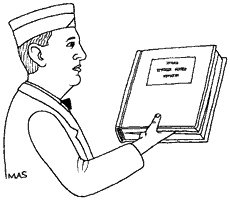
Movies
Pleasantville (New Line Cinema). Critics are lukewarm about this Truman Show knockoff. The premise: Two '90s kids are transported into a Father Knows Best-type sitcom and shake up its prissy black-and-white world. Their latter-day innovations: emotion and--as a sign that an individual has experienced it--color. This divides the town into two camps, color and black-and-white, whereupon the film goes downhill. Rife with moral didacticism and lapses in logic (how can the black-and-white mobs get so angry yet not burst into color?), Pleasantville turns into a "leaden political parable" about intolerance (Joe Morgenstern, the Wall Street Journal). (This fan site has a Pleasantville message board.)
Apt Pupil (Sony Pictures Entertainment). After director Bryan Singer's surprise hit The Usual Suspects (1995), Apt Pupil is deemed a disappointment. A teen-ager (Brad Renfro) discovers an old Nazi war criminal (Ian McKellen) living under a false name in his town and blackmails him into giving detailed accounts of Nazi atrocities. Renfro offers up the "dead-eyed sang-froid only a 16-year-old suburbanite can pull off" (Lisa Schwarzbaum, Entertainment Weekly), and McKellen is called "a supremely gifted actor at the top of his form" (Jay Carr, the Boston Globe). The film is said to be uneven, though, and when you add directorial missteps to the uncomfortable subject matter, the result is pans mixed with queasily laudatory reviews. (Watch the trailer at the official site.)
Soldier (Warner Bros.). Critics call this painfully predictable and clichéd futuristic sci-fi film a "mechanical, violent military-porn fantasy"(Schwarzbaum, Entertainment Weekly): Shane meets Terminator meets Road Warrior. An extremely buff Kurt Russell plays the title soldier of the future who, when decommissioned, is relegated to the horrors of the slag heap planet, where he discovers human emotion and rises to the defense of his fellow outcasts. Soldier's small number of fans call it a "sanctimonious kick-ass movie" (Carr, the Boston Globe). (Visit the official site.)

Books
King of the World: The Rise of Muhammad Ali, by David Remnick (Random House). The editor of The New Yorker takes on one of the most written-about sports figures in American history and "succeeds, more than any previous book, in bringing Ali into focus" (Allen Barra, the Wall Street Journal). Critics lavish praise on Remnick, not just for his analysis of Ali but because he is said to have brilliantly invoked the complex intersection of boxing and race relations in the 1960s. (Explore this gallery of photos of Ali that have appeared in the New York Times. Free registration required.)
Evening, by Susan Minot (Knopf). Reviewers adore Minot's "stunning" and "elegant and polished" (Michiko Kakutani, the New York Times) new novel. The book enters the mind of a dying woman and explores her painkiller-enhanced memories of her one great encounter with love. Critics agree that the novel lapses at times into "breathless overwriting" (David Wiegland, the San Francisco Chronicle) but remains "a narrative of considerable ambition and complexity" (The New Yorker). (Read an excerpt and an interview with the author here.)
Bech at Bay: A Quasi-Novel, by John Updike (Knopf). The third installment in the adventures of Henry Bech, an aging urban Jewish writer, is deemed "one of Updike's less ambitious works" but still "filled with pleasures" (Brian Morton, the Chicago Tribune). Although said to be occasionally self-indulgent, this collection of interconnected stories is hailed as generally witty, and its sendups of the publishing business are reported to have hit home. However, critics also suspect that Updike is getting tired of Bech. (Read an excerpt from the book. Free registration required.)
Recent "Summary Judgment" columns
Movie--Beloved;
Movie--Bride of Chucky;
Movie--Practical Magic;
Theater--Corpus Christi, by Terrence McNally (Manhattan Theatre Club);
Music--Live: 1966, by Bob Dylan;
Book--The Poisonwood Bible, by Barbara Kingsolver.
Movie--Holy Man;
Movie--The Mighty;
Movie--Slam;
Movie--A Night at the Roxbury;
Dance--Swan Lake (Neil Simon Theatre, New York City);
Book--Work in Progress, by Michael Eisner with Tony Schwartz;
Book--Pure Drivel, by Steve Martin.
Movie--Antz;
Movie--What Dreams May Come;
Movie--Happiness;
Book--I Married a Communist, by Philip Roth;
Television--The Secret Diary of Desmond Pfeiffer;
Art--"Van Gogh's Van Goghs: Masterpieces From the Van Gogh Museum, Amsterdam."
Movie--Ronin;
Movie--Urban Legend;
Book--Two Cities, by John Edgar Wideman;
Opera--A Streetcar Named Desire;
Music--Painted From Memory, by Elvis Costello with Burt Bacharach;
Television--Felicity;
Art--"From Van Eyck to Bruegel: Early Netherlandish Painting in the Metropolitan Museum of Art."
--Eliza Truitt